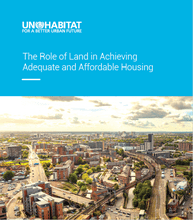The Role of Land in Achieving Adequate and Affordable Housing

01 September 2021
Global Land Tool Network, UN-Habitat
English
Guide/ Handbook
Africa, Europe, North America, South America
Despite the efforts of national and local governments, the private sector, civil society and the international community, access to adequate housing remains a major challenge for an increasing number of people throughout the world.
At the root of this challenge lies the legal and institutional frameworks by which land and housing are managed. A key factor in improving access to affordable housing is therefore to improve the governance and management of land markets, especially in urban and peri-urban areas where demand far outstrips supply, causing inflationary spirals.
This handbook provides tested approaches and practical frameworks for improving access to affordable housing and includes a range of tax-based, fee-based and development-based policy instruments, many of which have been applied in highly diverse contexts. In addition to land-based finance policy instruments, the handbook reviews ways in which urban land governance exerts both direct and indirect impacts on access to affordable and adequate housing. It stresses the need for the regulatory framework to formulate planning standards that reduce land costs and planning and building regulations that permit incremental housing construction, or the use of residential units for home-based economic activity. Similarly, it demonstrates the need for administrative procedures that are clear, simple and fast. Other factors include the need for spatial planning that puts land to efficient use, an institutional framework that is clear and a range of land tenure and property rights options available to reflect diverse and changing forms of housing demand.


Comments